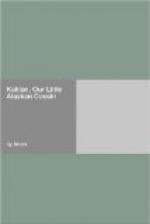“Huh! Innuit queer Indian!”
“No,” said Mr. Strong; “his hut is built by digging a hole about six feet deep and standing logs up side by side around the hole. On the top of these are placed logs which rest even with the ground. Stringers are put across these, and other logs and moss and mud roofed over it, leaving an opening in the middle about two feet square. This is covered with a piece of walrus entrail so thin and transparent that light easily passes through it, and it serves as a window, the only one they have. A smoke-hole is cut through the roof, but there is no door, for the hut is entered through another room built in the same way, fifteen or twenty feet distant, and connected by an underground passage about two feet square with the main room. The entrance-room is entered through a hole in the roof, from which a ladder reaches the bottom of the passage.”
“Can we go into a hut?” asked Ted.
“I’ll ask that woman cooking over there,” said Mr. Strong, as they went up to a woman who was cooking over a peat fire, holding over the coals an old battered skillet in which she was frying fish. She nodded and smiled at the boys, and, as Esquimos are always friendly and hospitable souls, told them to go right into her iglu, which was close by.
They climbed down the ladder, crawled along the narrow passage to where a skin hung before an opening, and, pushing it aside, entered the living-room. Here they found an old man busily engaged in carving a walrus tooth, another sewing mukluks, while a girl was singing a quaint lullaby to a child of two in the corner.
The young girl rose, and, putting the baby down on a pile of skins, spoke to them in good English, saying quietly:
“You are welcome. I am Alalik.”
“May we see your wares? We wish to buy,” said Mr. Strong, courteously. “You may see, whether you buy or not,” she said, with a smile, which showed a mouth full of even white teeth, and she spread out before them a collection of Esquimo goods. There were all kinds of carvings from walrus tusks, grass baskets, moccasins of walrus hide, stone bowls and cups, parkas made of reindeer skin, and one superb one of bird feathers, ramleikas, and all manner of carved trinkets, the most charming of which, to Ted’s eyes, being a tiny oomiak with an Esquimo in it, made to be used as a breast-pin. This he bought for his mother, and a carving of a baby for Judith; while his father made him and Kalitan happy with presents.
“Where did you learn such English?” asked Mr. Strong of Alalik, wondering, too, where she learned her pretty, modest ways, for Esquimo women are commonly free and easy.
“I was for two years at the Mission at Holy Cross,” she said. “There I learned much that was good. Then my mother died, and I came home.”
She spoke simply, and Mr. Strong wondered what would be the fate of this sweet-faced girl.




